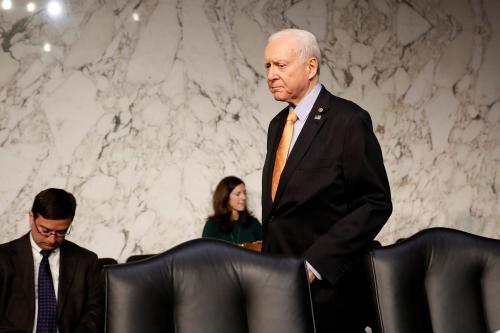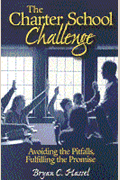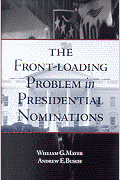The recent spate of mass shootings has propelled gun safety to the center of public concern, and the share of Americans demanding swift action has increased substantially. But discussion of this issue has been pervaded by myths about what the American people want, and why, and these misperceptions have made an inherently divisive debate even more difficult to resolve. Fortunately, recent survey research helps us clarify this murky issue. In sum: Most Americans are dissatisfied with the status quo and want to do something about it. Although they are divided as to the causes of gun violence and the ability of legislation to reduce it, they come together on a number of options for addressing it. But they don’t expect Congress to act, no matter how urgent the need.
Here, in greater detail, are eight facts about the state of public sentiment on this life-and-death issue.
Fact 1: The perceived threat of mass shootings by American citizens now dwarfs the threat of attacks by Islamist terrorists. 60 percent fear the former more than the latter; only 17 percent disagree. This holds true for Democrats and Republicans, liberals and conservatives, men and women, whites with and without a college degree, urban, suburban, and rural residents, and (by a margin of 53 percent to 23 percent) gun owners. But despite the urgency of this threat, only 15 percent of Americans, and fewer than one-third of Republicans, believe that the Trump administration has made the country safer from mass shootings (Fox).
Fact 2: When it comes to the causes of gun violence, the people are all over the map. Roughly equal majorities identify deficiencies in the mental health system and easy access to guns, especially assault-style weapons, as prime factors. Substantial minorities finger media coverage, bigotry of all sorts, and inadequate parenting. As expected, Democrats are substantially more likely than Republicans to cite factors such as access to guns, anti-immigrant sentiments, and the rise of white nationalism, while Republicans are more likely than Democrats to cite inadequate parenting and violent video games. The one exception: majorities of both Democrats and Republicans identify inadequate services for mentally ill individuals displaying violent tendencies as a contributor to acts of mass violence.
Fact 3: Surveys conducted during the past four months have shown strong public support for a range of measures to regulate the sale and possession of firearms.
| Morning Consult/Politico | NBC/WSJ | Fox | Quinnipiac | |
| Universal background checks | 90 | 89 | 90 | 94 |
| Red Flag laws | 76 | 81 | ||
| Banning assault weapons | 70 | 62 | 67 | 63 |
| Requiring gun licenses before purchases | 77 | |||
| Banning high-capacity ammunition magazines | 73 | |||
| Mandatory three-day waiting period | 80 | |||
| No gun purchases before age 21 | 83 |
Fact 4: When the issue is posed more generally and thematically, however, the results are less clear. For example, when the POLITICO/Morning Consult poll asked respondents which was more important, protecting the right of Americans to own guns or limiting gun ownership, respondents were evenly divided, with 44 percent for each option. The NBC/WSJ survey found that 45 percent of Americans were more concerned that the federal government would go too far in restricting gun ownership, while 50 percent were more concerned that the government wouldn’t go far enough. When Fox posed an even broader question, “Would you rather live in a country where people can own guns or where guns are banned,” 57 percent chose the former, which might be termed the “American” option, and only 34 percent the latter, the “European” option. These results reflect deep partisan divisions along the expected lines.
Fact 5: Despite these divisions, there are legislative proposals that could unify Americans. Ninety-two percent of Democrats favor criminal background checks on all gun buyers; so do 89 percent of Republicans. Eighty-eight percent of Democrats and 75 percent of Republicans support red flag laws (Fox). Ninety-two percent of Democrats would require individuals to obtain a license before purchasing a gun; 65 percent of Republicans agree (Quinnipiac).
Fact 6: While support for “stricter” gun laws has risen from its low of a decade ago, it remains below where it stood in the mid-1990s, the last time the federal government enacted such laws. In June of 1995, for example, just 35 percent of Americans were more concerned that the federal government would go too far, 10 points below today’s level, while 58 percent were more concerned that the government wouldn’t do enough, 8 points above the most recent reading (NBC/WSJ).
At the same time, the number of Americans who say it is more important to control gun ownership has steadily fallen over time while the number of Americans who believe it is more important to protect the right of Americans to own guns has increased.
Fact 7: Despite the widespread impression that Republicans care more about this issue than do Democrats, recent survey research shows that this is no longer true (if it ever was). When Gallup asked respondents whether they would only vote for candidates who shared their views on guns, 23 percent of Republicans and 25 percent of Democrats responded affirmatively. In 1999, 18 percent of Democrats compared to just 9 percent of Republicans said that they would only support such a candidate.
There is a divergence between partisan identification and ideology, however. Two decades ago, by a margin of 19 percent to 14 percent, liberals were more likely than conservatives to vote only for candidates who shared their views on guns. By 2017, this had reversed, with 32 percent of conservatives but only 23 percent of liberals requiring agreement as a condition of their support.
Fact 8+: Although substantial numbers of Americans believe that federal legislation would make a difference, they are dubious (if not downright cynical) that Congress will enact it. For example, Fox found that 42 percent of Americans believe the federal government can do “a great deal” to reduce gun violence, but the same percentage regard it as “not at all” likely that Congress will do so anytime soon.
The efficacy of legislation is contested across party lines, however. Almost two-thirds of Democrats believe that federal action would make a big difference, compared to just 21 percent of Republicans. This makes Republicans’ willingness to support a range of legislative measures all the more noteworthy. It appears that the felt need to go beyond the disturbing status quo is counteracting their skepticism that government action can improve the situation.











Commentary
Getting beyond the myths: What Americans really think about mass shootings and gun legislation
August 22, 2019